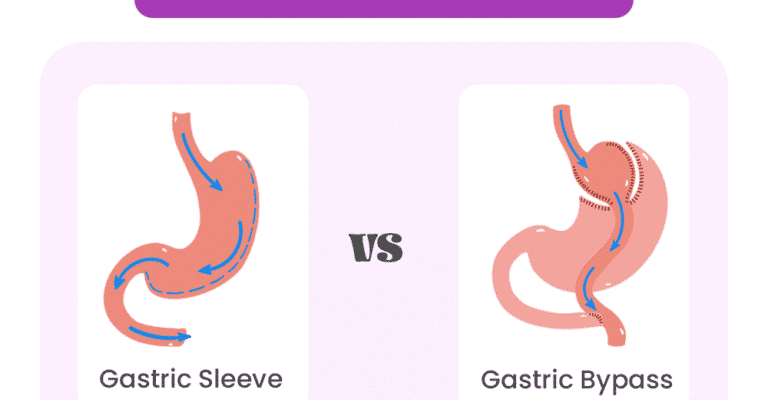
Gastric Sleeve Surgery vs. Gastric Bypass: Which is Right for You?
Table of Contents:
Last Updated on November 15, 2023
Introduction
Obesity is a global health concern that affects millions of people worldwide. It’s not just about appearance; obesity can lead to serious health complications like heart disease, diabetes, and even certain types of cancer.
For those struggling with obesity, weight loss surgery can be a life-changing solution. In this article, we’ll compare two popular types of weight loss surgery: gastric sleeve and gastric bypass.
Understanding Obesity

What is Obesity?
Obesity is a complex disease involving an excessive amount of body fat. It’s not just a cosmetic concern. It’s a medical problem that increases your risk of other diseases and health problems, such as heart disease, diabetes, high blood pressure, and certain cancers1.
Obesity is more than just carrying around extra pounds. It’s a complex medical condition characterized by an excessive amount of body fat. Obesity isn’t just about aesthetics; it’s a serious health concern that can significantly reduce a person’s life expectancy.
Obesity is typically measured using the body mass index (BMI), which is a calculation based on a person’s weight and height. A BMI of 30 or above is considered obese. However, it’s important to note that BMI is a rough estimate and doesn’t directly measure body fat. Some people with a BMI in the obese range can be perfectly healthy, while others with a normal BMI can have health problems associated with obesity.
The causes of obesity are multifaceted and can include genetic factors, lack of physical activity, unhealthy diet, medical conditions, and certain medications. Obesity increases the risk of numerous health problems, including heart disease, high blood pressure, type 2 diabetes, certain types of cancer, and sleep apnea.
What is Gastric Sleeve Surgery?

Gastric sleeve surgery, also known as sleeve gastrectomy, is a type of bariatric surgery designed to assist with weight loss. This procedure involves removing about 80% of the stomach, leaving a tube-shaped stomach about the size and shape of a banana2.
How a Gastric Sleeve Procedure Helps You Lose Weight
This surgery works in two ways.
First, it physically reduces the size of the stomach, which limits the amount of food you can eat at one time, promoting a feeling of fullness after eating smaller portions.
Second, the surgery affects gut hormones related to hunger, satiety, and blood sugar control, which can lead to a decrease in appetite.
Gastric Sleeve Surgery FACTS
- During sleeve gastrectomy, about 80% of the stomach is removed, leaving a tube-shaped stomach about the size and shape of a banana. \ Source – Mayoclinic
- One of the most significant benefits of sleeve gastrectomy is that it has a high success rate for significant weight loss. \ Source – ablison.com
- A 2011 study of 2,400 patients revealed that gastric sleeve surgery had much lower complication rates and reoperation rates than Lap Band surgery. \ Source – bariatricsurgeryco.org
What is Gastric Bypass Surgery?

Gastric bypass, or Roux-en-Y gastric bypass, is another type of bariatric surgery. In this procedure, the surgeon creates a small pouch at the top of the stomach and connects this new pouch directly to the middle portion of the small intestine, bypassing the rest of the stomach and the upper portion of the small intestine3.
This surgery works by restricting food intake and reducing the absorption of nutrients. The smaller stomach pouch means that you can’t eat as much as before, and because part of the small intestine is bypassed, fewer nutrients and calories are absorbed.
Gastric Bypass FACTS
- Gastric Bypass was initially introduced in 1967, but since then has advanced greatly over years – perfected by Benjamin Clapp, MD FACS, currently one of the best gastric bypass surgeons in El Paso. \ Source – Gastric Bypass Surgeon in El Paso, TX for Weight Loss | Dr. Clapp (elpasobariatric.com)
- About 85% of the left side of the stomach is removed, leaving only a thin tube-like sleeve of stomach about the diameter of the patient’s index finger. \ Source – BMCC (bariatricsurgeryco.org)
- On average, a mini gastric bypass surgery can take about 45 minutes to an hour to perform, however keep in mind that it will differ according to each patient and surgeon. / Source Ramsay Healthcare
Research References/Citations:
- Global trends in research related to sleeve gastrectomy: A bibliometric and visualized study – A comprehensive analysis of research activity in sleeve gastrectomy over the last two decades.
- Long-term Study of Bariatric Surgery for Obesity: LABS – NIDDK – A collection of studies on the risks and benefits of weight-loss (bariatric) surgery and its impact on the health and well-being of people who have obesity.
- Obesity Surgery – A leading journal dedicated to the field of obesity surgery, including sleeve gastrectomy research.
- Bariatric Surgical Practice and Patient Care – A peer-reviewed journal that covers all aspects of bariatric surgery and patient care, including gastric bypass.
- https://www.ncbi.nlm.nih.gov/pmc/articles/PMC8649568/
- https://www.ncbi.nlm.nih.gov/pmc/articles/PMC7052082/
- https://bariatricsurgery.ucsf.edu/research/research-areas.aspx
Gastric Sleeve vs. Gastric Bypass: A Comparative Analysis
Procedure
While both procedures aim to help patients lose weight by altering the structure of the stomach, they do so in different ways. Gastric sleeve surgery involves removing a portion of the stomach, while gastric bypass involves rerouting the digestive tract.
Benefits
Both procedures can lead to significant weight loss. Gastric bypass often results in faster weight loss, while gastric sleeve may be recommended for patients with complex medical issues.
Risks and Complications
Like all surgeries, both procedures come with risks, including infection, bleeding, and complications from anesthesia. Long-term risks may include nutritional deficiencies and gallstones.
Success Rates
Both procedures have been shown to be effective for weight loss, but individual results can vary. Success often depends on a patient’s commitment to lifestyle changes post-surgery.


Making the Right Choice: Factors to Consider
Choosing between gastric sleeve and gastric bypass surgery is a significant decision that should be made in consultation with your healthcare provider.
Here are some factors to consider:
- Your BMI: Both surgeries are typically reserved for people with a BMI of 40 or higher, or a BMI of 35 or higher with a serious weight-related health problem such as type 2 diabetes or high blood pressure.
- Your health history: Certain medical conditions might influence the choice of procedure. For instance, gastric bypass might be a better option for people with severe gastroesophageal reflux disease (GERD) or diabetes.
- Your lifestyle: Both procedures require significant lifestyle changes after surgery, including a healthy diet and regular exercise. It’s important to consider whether you’re ready and able to make these changes.
- Risks and benefits: Each procedure has its own set of risks and benefits. Gastric bypass tends to result in more rapid and significant weight loss, but it also has a higher risk of complications and nutritional deficiencies.
Remember, the goal of weight loss surgery isn’t just to lose weight — it’s to improve your health and quality of life. The best procedure for you depends on your individual circumstances and should be decided in consultation with your healthcare provider.
Conclusion
Whether you choose gastric sleeve or gastric bypass surgery, the goal is the same: to help you achieve a healthier weight and improve your quality of life. It’s important to discuss these options with a healthcare professional who can guide you to the best decision for your individual needs.
Why Choose SleeveClinic for Your Weight Loss Surgery?
At Sleeve Clinic – #1 Weight loss clinic in Mississauga ON, we specialize in gastric sleeve surgery. Our team of experienced gastric sleeve surgeons and supportive staff are committed to your weight loss journey. We offer comprehensive care, from initial consultation to post-operative support.
Ref/Citations
- Obesity – Symptoms and causes – Mayo Clinic
- Sleeve Gastrectomy – Mayo Clinic
- Gastric Bypass (Roux-en-Y) – Mayo Clinic

Ready to take the first step towards a healthier you?
Contact SleeveClinic today to schedule a consultation. Let us help you on your weight loss journey.






